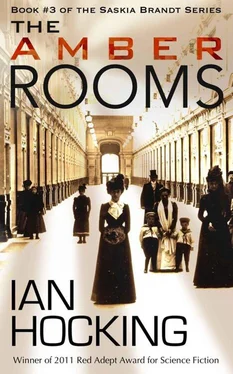Meanwhile, a huge dog emerged from the rear of the villa and ambled into the miniature deer-park of trees and remained there.
Saskia let her bag slip from the branch and then dropped after it. The fall was almost three metres. She kept her feet together and rolled to a standing position. Then she continued into the grounds with the pomp of a lady visitor in full daylight.
A stone porch ran along the front of the villa. She mounted the steps, looked left and right—nobody—and pulled the bell.
Two minutes passed.
Three.
Saskia glanced back at the gate. The shadows beneath the wall were deep. She slipped into the infra-red.
Nothing. Only one reddish stain where she had placed her palm after dropping from the tree.
The door opened. The butler was a young, bald man. He carried that same lamp: a storm lantern, swinging as he lifted it to her face. His uniform was complete, with none of the compromises one might expect given the hour. Saskia and the butler—if this was indeed the Count’s Mr Jenner—had never met. That had been one of the Count’s rules.
‘Good morning,’ she said, relishing the flat sounds of English. ‘I apologise for arriving so early, but it is vital that I meet with the Count.’
‘I’m afraid the Count is not available.’
Saskia said, ‘I’m sure he will make himself available. Will you please tell him that Ms Tucholsky is here?’
‘You misunderstand me.’
‘Add that I need to leave for Russia sooner than we thought. Today, in fact. This minute. It is important.’
The butler seemed genuinely apologetic. ‘Ms Tucholsky, the Count is not at home. He left the country only last night.’
‘Oh,’ said Saskia. She told herself that this was not the disaster it seemed. True, the Count had been her best hope for a safe return to Russia. He had the documentation, the route, and the people. She would find another way. She had to. This was not a disaster.
But she had to blink back her tears. In their months of conversation, she had come to rely on his steady voice, that focus in his thoughts.
Saskia tried to smile. ‘That is unexpected.’
‘“Unexpected” is the word that the Count used, Ms Tucholsky.’ The butler lowered the lantern.
‘Did he leave anything for me?’
The butler gave way.
‘Please come in.’
~
The Count’s library was a windowless room in the east wing of the villa. The walls were white and the floor dark. Its books were set in gated alcoves. An English partners’ desk occupied the centre of the room. Saskia noted the fountain pen missing from its holder; an ebony cradle telephone; two atlases open at north-west Russia; and a larger map of Finland, held flat by brass paperweights. The Count might have left minutes before. He wore a popular cologne called Mouchoir de Monsieur , and its fragrance lingered.
The butler indicated the desk chair. It smelled of varnish and pipe smoke. She sat down and assumed her habitual posture: back straight, hand and wrist inside her warmer, head tilted at an angle to indicate interest.
She raised her eyebrows at the butler. He reached for the green-hooded lamp on the desk and flicked its switch. The bulb crackled like a gramophone and gave little light. The butler tapped the bulb to improve its connection, and the room became dark and bright haphazardly, putting Saskia in mind of clouds crossing the sky on a sunny day. She was glad this room had no windows.
When the electric light had established itself, Saskia said, ‘You’re Mr Jenner, I recall.’ She had learned to remain formal with servants. Twenty-first century familiarity was too often construed as rudeness.
‘That’s correct, madam,’ said Mr Jenner. He lowered the wick on his lantern and placed it on a sooty-looking ceramic dish near the atlas.
‘Like the doctor who developed the science of vaccination?’
‘I’m proud to say he was a direct ancestor.’
‘You should be,’ she said. It was a patronising remark, and it embarrassed her, but the remark was not so unusual given the clear boundaries of their relationship. ‘Now, may I see the things that the Count left for me?’
‘Certainly,’ he said. ‘However, the Count indicated that these materials are quite sensitive, and requested that I confirm the identity of the person who calls for them.’
‘It’s a pity you never saw me during my visits to the villa. I’ve been coming here since the autumn.’
Mr Jenner paused. She guessed that he did not wish to say that it was not his business to notice the comings and goings of women if they entered through the greenhouse rather than the front door, and came only at night.
‘I see the Count was right to trust you,’ Saskia said. ‘However, there is a small chance that I was followed here, and I’d like us to proceed directly.’
‘Of course,’ Mr Jenner replied. He indicated her left hand. ‘May I?’
‘Be my guest.’
Saskia removed her left wrist from the warmer. She unfastened the watch strap that held the sock. As she tugged this away, revealing the scarred stump—skin folded as neatly as gift wrapping—Mr Jenner did not wince. She liked that.
‘The Count asked me to tell you,’ he said, ‘that he has been recalled to St Petersburg as a matter of urgency, and that the plans you discussed still hold. He left these for you.’
Mr Jenner produced a set of keys from his waistcoat and unlocked a drawer. This he slid out completely and placed on the desk. Then he reached into the gap, pressed something, and drew out a second box from deeper within the desk. It opened to reveal a leather document wallet.
‘Thank you,’ said Saskia. ‘Will you leave me alone for a moment?’
Mr Jenner took his lantern and left without another word. She waited for his footsteps to recede. Then, fastening the sock around her stump once more, she spread the contents of the wallet on the desk. It contained six drawings, in the Count’s hand, of a stately room. Saskia knew that he had published botanical monographs, and the drawings evidenced his fine eye. She turned the pages clockwise and anticlockwise, noting the entrances and exits to the chamber. The last page was an overhead view of the stately room. The Count had placed question marks next to some objects.
At the top, the Count had written: The Amber Room.
The envelope also contained high-quality pamphlets on the history of the Tsar’s Village. Last, there were two Russian passports, one foreign and one internal. Both were forgeries of the first order. Their owner was an aristocrat named Yelena Alekseeva Korovin. Age: twenty-eight years. Height: medium. Distinguishing marks: none. That would do. She closed the wallet and pushed it into her bag.
She turned to leave, but was surprised by the presence of the butler in the doorway. He stood quite still and appeared uncomfortable.
‘What’s wrong?’ she asked.
‘I’m afraid that there are two men outside.’
Saskia frowned. She struggled to suppress the thoughts that followed: How had they traced her here? Had they known about the Count all along? Had others kept the villa under surveillance?
‘Did they see you?’
‘I don’t know.’ The butler cleared his throat. He was trying to pull himself together. ‘I don’t know. I can’t be sure.’
‘Where are they?’
‘To the north, in the higher garden. One is carrying a night lantern. He tried to hide it, but I saw. They haven’t approached the house.’
‘And you came straight back?’
‘Yes.’
The butler looked down at the pistol he was carrying. As he flexed his grip, Saskia noticed an oddity in the tiny movements made by the weapon. The movements did not correspond well to its centre of gravity. Its mass was off by several per cent.
Читать дальше












